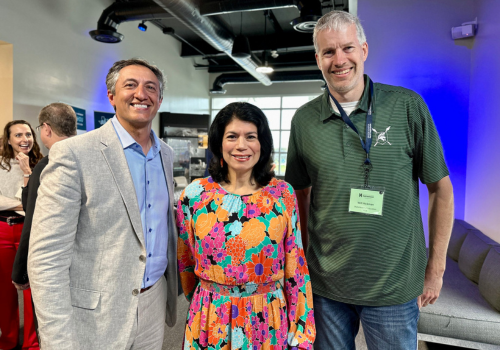Legislative Session Update: Week 12
Published Mar 29, 2019 by Taylor Landin
During the 86th Legislative Session, the Partnership will provide a weekly update on our top executive priorities and other newsworthy items from Austin.
The Legislature was focused on the budget this week and made significant progress. The House worked well into the evening on Wednesday night to pass the budget bill, House Bill 1, the only bill the Legislature is constitutionally required to pass. HB 1 outlines $250 billion in state spending for the next biennium. As expected, the House kept the pillars of its budget intact, including $9 billion in new state funding for public education, including nearly $2.7 billion for local property tax compression. The Senate is expected to debate and pass its version of the budget, Senate Bill 1, next week. The Senate’s budget bill (SB 1) allocates the same amount for public education but prioritizes the dollars for different education initiatives. After the House approved the budget, members of the House Committee on Ways & Means voted out their property tax reform proposal, which contains many provisions not included in the Senate property tax legislation passed early in session.
PARTNERSHIP EXECUTIVE PRIORITIES
PUBLIC EDUCATION
On Wednesday, the Senate Finance Committee approved the Senate budget, which includes additional funding for public education. The increased spending plan in the Senate will provide $3.9 billion for an across-the-board $5,000 pay raise for full-time teachers and librarians and $2.7 billion for property tax compression. This leaves $2.4 billion for public school finance reform. The Partnership remains focused on how the budget allocates funding to achieve meaningful reform, especially as it relates to teacher merit pay. Senate Education Committee Chairman Larry Taylor (R-Friendswood) told the Texas Tribune this week that he will likely wait for the House bill to reach the Senate instead of moving his own legislation.
In the House, the focus has already turned to next week’s scheduled floor debate on school finance reform. The author of the bill, House Public Education Committee Chairman Dan Huberty (R-Kingwood), met with members of the House this week to secure support for the bill. While the bill mirrors many of the recommendations made to the Legislature by the Texas Commission on Public School Finance, three critical reform measures were not included: funding to reward school districts for increasing third grade literacy, funding tied to improving college, career, and military readiness, and funding to provide a pay increase for the highest performing educators. The full effect of the legislation on school districts is not completely clear, but our understanding is that the majority of school districts across the state will benefit from this legislation.
THE BUDGET
In the early hours of Thursday morning, following nearly twelve hours of debate, the House passed House Bill 1, the $250 billion budget for the upcoming 2020-2021 biennium. The availability of tax revenues and ample bipartisan agreement for increased investment in public education and property tax reform eased the tensions that often animate the budget-writing process. Funding for other agencies and programs important to the Houston region include:
- $600 million, equal to the current biennium, for the Cancer Prevention and Research Institute of Texas dedicated to accelerating advancements in cancer prevention and cures.
- $60.6 million, or $3.4 million more, for the Skills Development Fund program for vocational training.
- $26.2 million for the Governor’s University Research Initiative aimed at helping Texas public institutions of higher education recruit distinguished researchers from around the world to the State of Texas. The current biennial budget allocated $5.6 million to the program.
- $111.8 million, an increase of $25.8 million, for the Texas Enterprise Fund, the state’s primary economic development deal closing fund.
- $154.7 million for the Texas Emissions Reduction Plan to provide financial incentives to reduce emissions from polluting vehicles and equipment. This is a slight decrease of $1.6 million from the current budget.
- $154 million to an account operated by the Governor’s Office to enhance economic development in Texas. The Governor may direct most of these funds to other economic development programs such as the Moving Image Industry Incentive Program. This is a $10 million increase from the current biennium.
WEEK IN REVIEW
Property Tax Reform
On Thursday morning, the House Committee on Ways & Means voted out Chairman Dustin Burrows’ (R-Lubbock) property tax reform bill, House Bill 2, which included several changes to the 2.5% rollback cap but kept the transparency provisions intact. For example, House Bill 2 retains reforms to the appraisal review board and appraisal rate setting designed to make the process fairer and more transparent to property owners. The bill keeps the 2.5% property tax revenue growth rollback rate for cities, counties, and other major governmental entities, but it does not apply to sales tax revenue growth. Unlike the Senate’s proposal, authored by Senate Committee on Property Tax Chairman Paul Bettencourt (R-Houston), HB 2 exempts school districts, community colleges, emergency service districts and hospital districts from the cap. Regarding the exemption of school districts from the bill, Chairman Burrows stated that the House’s school finance reform bill will address school district property tax reform. The House proposal adopted by the committee also includes a carryover rate, allowing cities and counties to bank excess tax capacity under the cap over multiple years, if the five-year average remains under 2.5%. The bill is likely to be debated on the House floor in mid-April.
Ports
The Senate Select Committee on Ports debated three bills with the potential to impact the Port of Houston. Among them is Senate Bill 2223, authored by Chairman Brandon Creighton (R-Conroe), which would set maximum ship lengths at 1,100 feet in the Houston Ship Channel and allow for limited two-way traffic if ship pilots can maintain safe operations. A ship may only exceed the length restriction if two-way traffic can be safely and efficiently maintained.
Economic Development
The House Committee on Ways & Means voted out two important economic development bills this week. House Bill 360 by Representative Jim Murphy (R-Houston) extends for 10 years the Chapter 312 economic development program, which allows cities and counties to provide tax exemptions or reductions. The committee also passed House Bill 2129 by Representative Murphy, which extends Chapter 313, a similar program operated by school districts. Both programs have helped spur billions of dollars in economic development in the Houston region and are strongly supported by the Partnership and statewide business community. We anticipate both bills will be heard on the House floor in the coming weeks.
Stay up-to-date with our Policy Team throughout the 86th Legislative Session by opting-in to this weekly update or follow the team on Twitter @GHP_Policy
 The Houston Report
The Houston Report




















